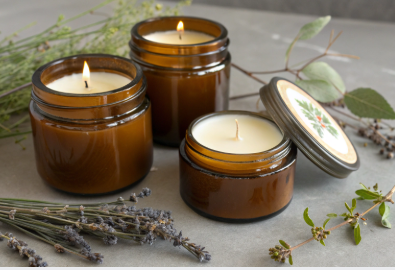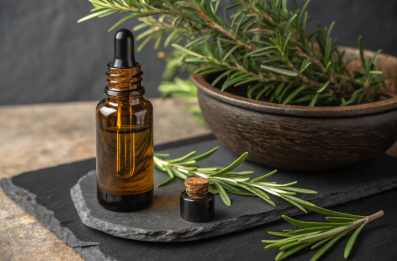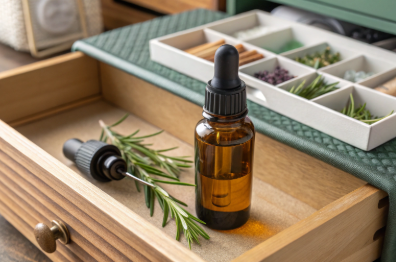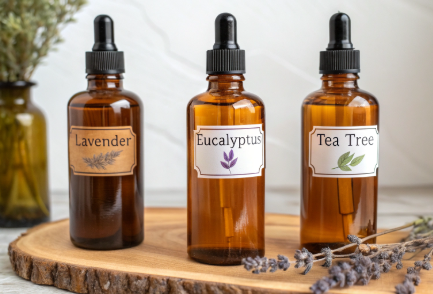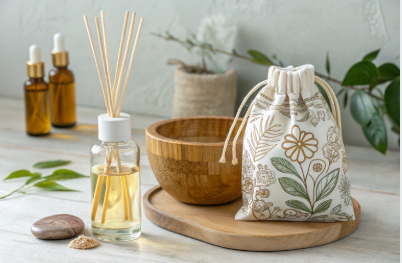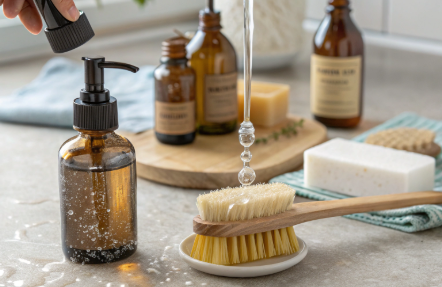Notice your rosemary essential oil smells weaker than it used to? Or worse—turned rancid? Improper storage might be the culprit.
Rosemary essential oil should be stored in a cool, dark place inside an airtight amber or cobalt blue glass bottle to preserve its potency and prevent oxidation.
If you're using rosemary oil for beauty, wellness, or product development, storage isn’t optional—it’s critical. Let’s walk through how to do it right.
How to store rosemary essential oil?
Rosemary oil is packed with volatile compounds—and they're fragile. Light, heat, and oxygen are its biggest enemies.
Store rosemary essential oil in a dark glass bottle, away from sunlight and heat sources, ideally in a cabinet or drawer, tightly sealed after each use.
Best Practices:
1. Use Amber or Cobalt Blue Glass
These colors block harmful UV light that can degrade the oil’s quality over time.
2. Avoid Temperature Fluctuations
Choose a location that stays stable year-round. Think: bathroom cabinets or kitchen drawers away from appliances.
3. Seal Immediately
Always close the cap tightly after use to minimize air exposure and preserve aromatics.
At PauPack, we specialize in amber glass bottles with leak-proof droppers and caps—ideal for essential oil stability and resale packaging.
Do I have to refrigerate rosemary oil?
Some oils benefit from cold storage—but is refrigeration necessary for rosemary?
You don’t have to refrigerate rosemary essential oil, but storing it in a cool, consistent environment (below 77°F or 25°C) can extend its shelf life.
When to Consider Refrigeration:
-
In Hot Climates: If your room temps often rise above 86°F (30°C), a fridge drawer is a safe bet.
-
For Long-Term Storage: If you’re not using the oil daily, refrigeration keeps it fresher longer.
Tip: If refrigerated, bring oil to room temperature before use to avoid condensation inside the bottle.
At PauPack, we help brands package rosemary oil for global markets—including hot zones—by offering heat-resistant sealing options and insulated packaging for bulk transit.
Can I put rosemary oil in a plastic bottle?
Plastic may seem convenient—but it’s risky when it comes to potent essential oils.
No, rosemary essential oil should not be stored in plastic bottles, as it can break down the plastic and leach harmful chemicals into the oil.
Here’s why:
-
Essential Oils Are Solvents: They degrade many types of plastic over time, especially PET or HDPE.
-
Plastic Affects Purity: The oil’s aroma, color, and composition may change when reacting with plastic.
Acceptable Exception:
If temporarily using plastic (e.g. for samples), opt for thick, essential oil-compatible PET-E or aluminum-lined materials—and never long-term.
For safety and stability, PauPack always recommends glass containers for essential oils. Our dropper bottles are made from pharmaceutical-grade materials and available in multiple sizes and finishes for retail or lab use.
Do essential oils have to be stored in glass?
Glass seems to be the go-to—but is it really necessary?
Yes, essential oils should always be stored in glass bottles—preferably dark-colored—to avoid chemical reactions, preserve quality, and prevent leakage.
Why Glass Wins:
-
Non-Reactive: Glass doesn't interact with oils the way plastic or metal might.
-
Airtight: Glass offers better sealing for long-term use.
-
Brand Appeal: Amber or frosted glass enhances your product's premium image.
Bottle Features to Look For:
-
Tamper-evident caps
-
Euro dropper inserts
-
UV protection coating
-
Customizable labeling area
At PauPack, we not only supply essential oil-grade glass bottles, but also offer full OEM/ODM services. That means your rosemary oil bottles can be custom-shaped, printed, and boxed—ready for market.
Conclusion
Rosemary essential oil needs protection to stay powerful. With proper storage—cool, dark, airtight, and always in glass—you’ll preserve every drop. PauPack has the packaging to help you do just that.




